With a hope to connect hearts, Shabana Azmi, a renowned film artist & social activist, has produced a 90-minute film titled - Mee Raqsam, directed by her brother Baba Azmi. Mee Raqsam, which is welcomed by many as seen in the reviews, recently has been announced as the opening night film for CoSAFF 2020 (The Coalition of South Asian Film Festivals (CoSAFF). It is a first of its kind event that brings together seven well-established South Asian institutions from across North America. The virtual festival will run for 15 days from October 3-17, featuring free online screenings of the latest films and web content, along with Q&As with the creators.
About the film
Mee Raqsam - the title of the film in the Persian language means “I Dance”. One can term this film as a simple story-narration that powerfully brings to light the difference between the ‘created reality’ and the ‘actual reality’ around us regarding concepts like Art, Culture, Religion, Nation, and God!
Mee Raqsam tells us a story about a father-daughter relationship, where the father - Salim (played by Danish Husain), in the absence of his late wife, humbly yet firmly supports the aspiration of his adolescent daughter - Mariyam (played by Aditi Subedi) to learn Bharatanatyam dance.
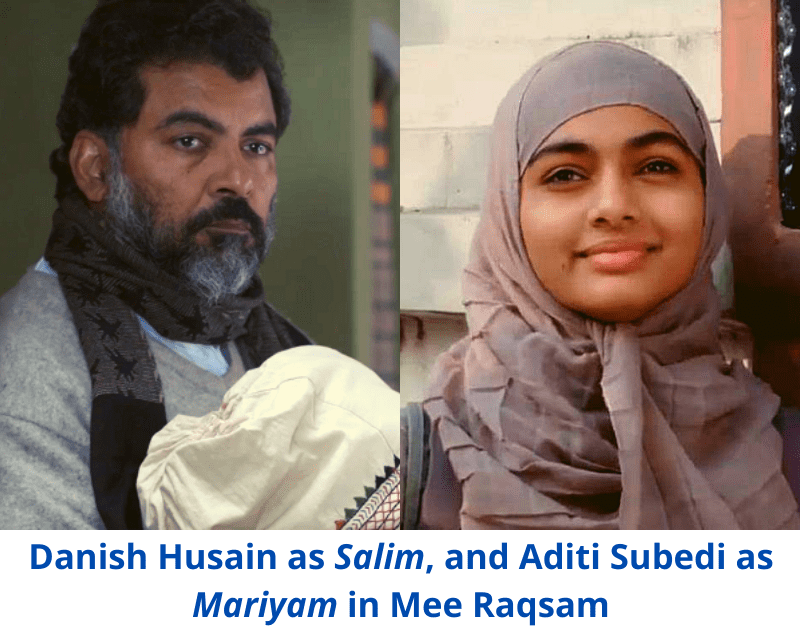 Later, as the film progresses, this seemingly ordinary story takes us deep enough to make us experience how a child’s genuine desire to learn a dance that belongs to her own country’s culture, can badly trigger the fake notions of religion, culture, and at a point also God itself! ...And this conflict is created because the desiring and deserving child, Mariyam, belongs to the Muslim community and wants to learn the Bharatnatyam dance that seemingly belongs to the “Hindustani Sabhyata”.
Later, as the film progresses, this seemingly ordinary story takes us deep enough to make us experience how a child’s genuine desire to learn a dance that belongs to her own country’s culture, can badly trigger the fake notions of religion, culture, and at a point also God itself! ...And this conflict is created because the desiring and deserving child, Mariyam, belongs to the Muslim community and wants to learn the Bharatnatyam dance that seemingly belongs to the “Hindustani Sabhyata”.
Mee Raqsam’s storyline has a simple graph with five basic literary elements in its plot. The beginning - where we get introduced to the above characters - Salim and Mariyam, and their story of joining a Bharatnatyam dance class in the school which is “mohalle ki dusri taraf’ (on the other side of the Mohalla).
The conflict - where we get to know the antagonists - Hashim Sheth (played by Naseeruddin Shah), who thinks of himself as the ‘Islaam dharma rakshak’; Jayprakash (played by Rakesh Chaturvedi Om), who claims to be the ‘Hindu dharma bhakt’; Zehra khala (played by Shradha Kaul), who has declared herself to be in charge of training other young girls to behave like a ‘woman’, follow the rules set by the society, and at least learn some ‘silai kadhai’ (stitching & embroidery) work to earn a living! During this conflict, the antagonists get challenged by the fact of a Muslim girl fulfilling her desire of learning Bharatnatyam.
The rising action - where we get to experience the journey of how one by one, through different means of threats & violence, these antagonists begin to ‘save’ their own culture, religion, and God from this little girl and her father! How can a small girl’s desire to learn a dance affect the cultures or religions or God?
Mee Raqsam shows you ‘how’…
The climax - where we, as an audience, ‘know’ that Mariyam should continue dancing and there is nothing ‘gair-mazhabi’ (anti-religion) or ‘rashtra virodhi’ (anti-national) in it, but the story unfolds so realistically, that we would have ‘not dared’ to say that aloud to Mariyam in that given situation!
The falling action - where we get to experience the breaking point of Mariyam, where she feels that - “Mujhe nahi pata tha ki dance karne ki itni badi kimat chukaani padegi...” (she had never thought she would have to pay such a big price for dancing).
At this point, Uma teacher (played by Sudeepta Singh), who teaches Bharatnatyam to Mariyam, begins to seem visibly important. She is a flat character in the story, who has already discovered her truth, and has somewhat overcome her inner struggle where she is now determined and ready to facilitate the courage of standing for themselves to those who need it.
The resolution - where we get to see what happens to Mariyam, finally, after so much of churning and journeying! Baba Azmi and his team have subtly utilized the powerful creativity of Sufi music & Bharatnatyam dance together, where we witness Mariyam reaching a point of surrender, which is worth experiencing.
The dialogues used in the film maintain the simplicity and realness of the story and the characters. They help us to understand different characters empathetically. For instance - Salim, the father, who is a tailor by his profession, is a humble man. He has very few basic needs to live. He is an ordinary man, yet his genuineness keeps him open enough to convey his humble and firm thoughts to the threatening Hashim Sheth and his gang that - “Hamara Islaam itna kamzor nahi hai ki ek bachchi ke dance karne par uski tauheen ho jaaye” (our Islaam is not so weak that it would be offended by a little child’s aspiration to dance).
The dialogues from the character like Zehra Khala expresses the confused and ignorant state of women in our society when she says - “mere behen ki laash abhi tak thandi nahi hui aur aap uski beti ko naachne bhej rahe hai? Tawaif banane ka irada hai kya?” (My sister died just a few days back, and you are sending her daughter to dance? Do you wish to make her a prostitute?) It also subtly focuses on how a woman treats another woman in our society, which ultimately leads to empowering the patriarchal hegemony.
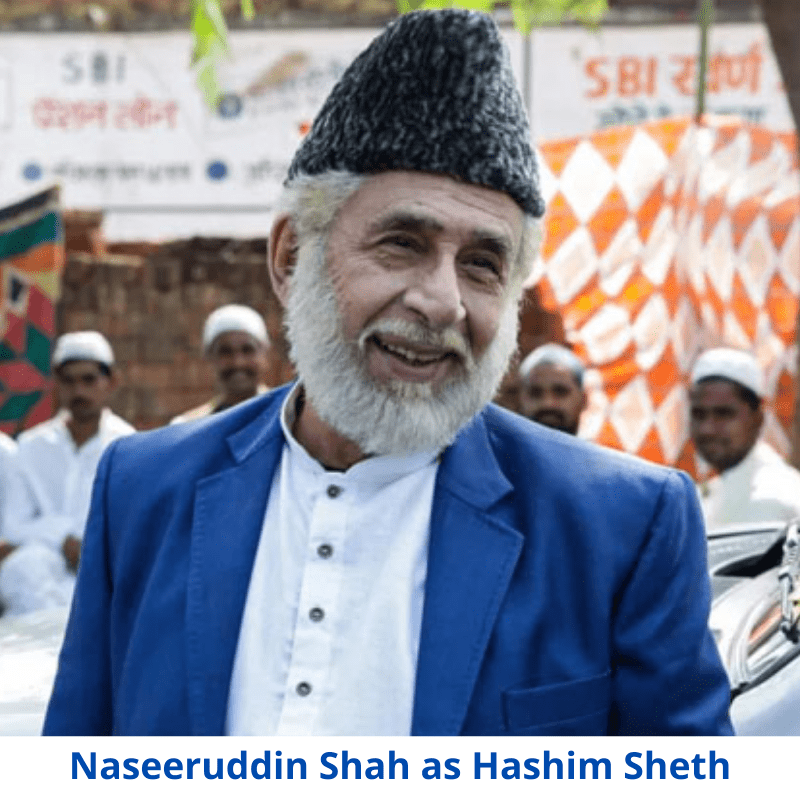 The dialogues from antagonist characters Hashim Sheth and Jayprakash puts light on the double standard thinking of our leaders whom we blindly follow and worship! The way we are kept in fear constantly is conveyed when Hashim Sheth says - “katra jab katron se mil ke rehta hai tabhi dariya banta hai. Akeli boond dhoop nahi seh sakti…bhaap banke fanah ho jaati hai.” (A drop, when merged with another droplet, forms a river. No drop can alone bear the sun, it perishes into vapor). The film has many such powerful dialogues that keep us connected to the story.
The dialogues from antagonist characters Hashim Sheth and Jayprakash puts light on the double standard thinking of our leaders whom we blindly follow and worship! The way we are kept in fear constantly is conveyed when Hashim Sheth says - “katra jab katron se mil ke rehta hai tabhi dariya banta hai. Akeli boond dhoop nahi seh sakti…bhaap banke fanah ho jaati hai.” (A drop, when merged with another droplet, forms a river. No drop can alone bear the sun, it perishes into vapor). The film has many such powerful dialogues that keep us connected to the story.
The music and songs like ‘ye jo sheher hai’ and ‘dam ali ali’ by Ripul Sharma help us to get deeply involved in the journey of Salim and Mariyam, where they struggle to ‘live their life by their own choices and that too with respect’.
Why is this film relevant today?
We all are aware of the richness of our Indian cultural system, out of which the family system is a very important component. Mee Raqsam talks about the beauty of this cultural family system and its role, where an ordinary father like Salim, plays the role of both mother and father for his daughter. This brings to light the ardhanari nateshwar (also known as Ardhanārīśwara) concept from our Indian culture. Connoted from which, a father actually has many different roles to play - some, which are naturally played by the masculine capacity within him, and others which can develop from the feminine power within himself!
How many fathers in our country might be using their feminine power while raising their children? Mee Raqsam gives us an actual picture of what can happen to a daughter when she receives a strong foundation to build up her aspirations, which she deserves to live. No one can stop her from believing in herself and living what she wants to live, once she is embraced by the first male in her life - her father!
Shabana Azmi, who is also the head of the Mijwan Welfare Society which works for the women empowerment and equal opportunity for women, when asked in an interview about this film, shared that, “Mee Raqsam is a tribute to Kaifi Azmi - our father and renowned Urdu poet, writer, and social activist. He was a father who played roles for us, which were far away and different from the typical role of a father set by a patriarchal society. I feel this is necessary for us to understand.”
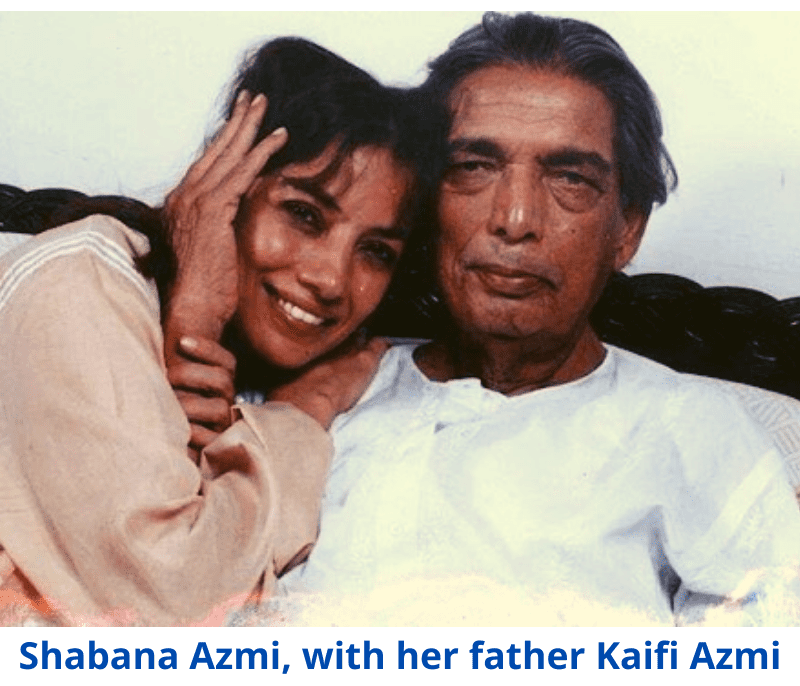 She further shared that, “Kaifi Azmi had once mentioned to Baba Azmi about making a film in Mijwan, Uttar Pradesh, which is also our native place. I am glad that we could fulfill his wish through Mee Raqsam. Actually, what has happened is due to the explosion of Information Technology and different media, the people from remote areas have aspirations now, but they don't have the means to fulfill them, which leads to a lot of frustration. It is necessary to create role models for them where they could actually see that there are possibilities, and they can do it too. Aditi Subedi, who plays the role of Mariyam in the film, is herself from Mijwan,UP. Nothing can be more satisfying than seeing a deserving child, like Aditi from a small village, receiving and utilizing the opportunity to fulfill her aspiration in reality.”
She further shared that, “Kaifi Azmi had once mentioned to Baba Azmi about making a film in Mijwan, Uttar Pradesh, which is also our native place. I am glad that we could fulfill his wish through Mee Raqsam. Actually, what has happened is due to the explosion of Information Technology and different media, the people from remote areas have aspirations now, but they don't have the means to fulfill them, which leads to a lot of frustration. It is necessary to create role models for them where they could actually see that there are possibilities, and they can do it too. Aditi Subedi, who plays the role of Mariyam in the film, is herself from Mijwan,UP. Nothing can be more satisfying than seeing a deserving child, like Aditi from a small village, receiving and utilizing the opportunity to fulfill her aspiration in reality.”
60 years ago, when Wahida Rehman had begun to learn Bharatanatyam dance, her father - who was the then-District Magistrate - was threatened by the people about ‘how can you let your daughter learn Bharatanatyam?’ Today, after 60 years, we are still doing the same thing, with the same ignorance and hatred for each other.
Therefore, Mee Raqsam tries to spread positivity and hopeful vibes serving the purpose of joining hearts in the current time, where some elements in our society are hell-bent on dividing hearts. Art has the power to shape a human being. We all have seen in the pandemic time and in similar bad times that Art has come to our rescue. Be it painting, dancing, drawing, singing, writing, or any simple DIY creativity! It has helped us maintain our sanity.
This film shows that Art has the sensitivity to create an atmosphere of sensitivity where change can happen. It shows how Art builds in the courage of conviction towards our desire to live by our own choice, which can make us brave enough to face any mental and physical threats, that too more than once. The film also underlines that anyone can choose to not to believe in certain irrational beliefs and unnatural rigidity, as well as, at the same time, also not to disown the community that you belong to.
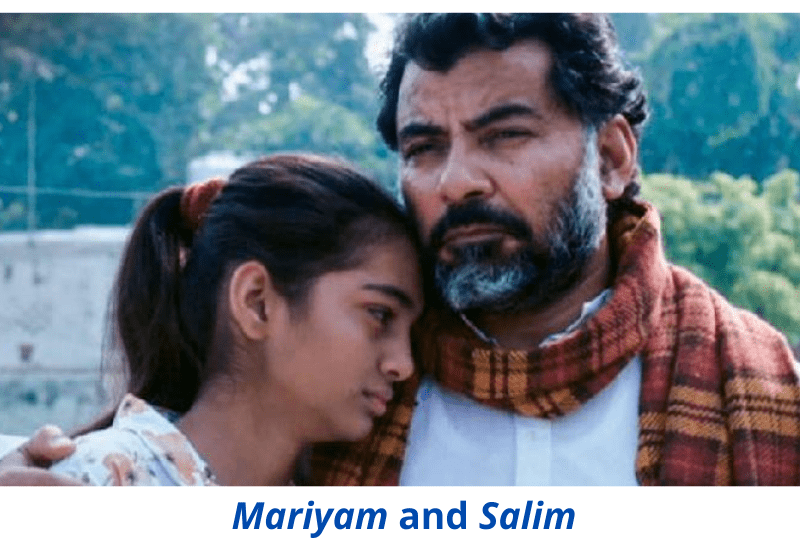 The father - Salim, in the film, is committed to secular, humane, and liberal values. He does not blame anyone but also is not ruled by anyone. With the non-violent approach of moving ahead, he inculcates in his daughter Mariyam the courage to not to believe in the sectarian faiths and practices. On the contrary, he allows her to hold hands with the universal human values through her favorite art form - Bharatanatyam.
The father - Salim, in the film, is committed to secular, humane, and liberal values. He does not blame anyone but also is not ruled by anyone. With the non-violent approach of moving ahead, he inculcates in his daughter Mariyam the courage to not to believe in the sectarian faiths and practices. On the contrary, he allows her to hold hands with the universal human values through her favorite art form - Bharatanatyam.
Mee Raqsam stays on our mind for a long time with a hope of uniting hearts and also freeing ourselves from the dominating ‘created realities’ which keep us away from the ‘actual reality’. As Kaifi Azmi says in his poem-
Yeh guftagu guftagu nahin hai, bigadne banne ka marhala hai
Dhadak raha hai faza ka dil ke zindagi ka ma’amla hai
Yeh tirgi ka hujoom kab tak, yeh yas ka izdaham kab tak
Nifaq-o-ghaflat ki aad le ke jiyega mardum nizam kab tak
Rahenge Hindi aseer kab tak, rahega bharat ghulam kab tak
Gale ka tauq aa rahe qadam par kuchh is tarah tilmila ke uthna...
Which means -
This dialogue is not just a dialogue, it is the stage of making or spoiling
The heart of the environment is beating faster because it is the question of life
How long shall remain this enveloping darkness, how long this mammoth sadness
How long shall this wretched system survive taking cover under discord and unconcern
How long shall Indians remain prisoners, how long shall Bharat remain subjugated
Rise with such a force that the chain around your neck falls on your feet…
- Deepali Awkale
deepaliawkale.25@gmail.com
(Know more about Mee Raqsam at CoSAFF here.)
Tags: film review deepali awkale shabana azmi Baba Azmi mee raqsam literature art cinema Load More Tags

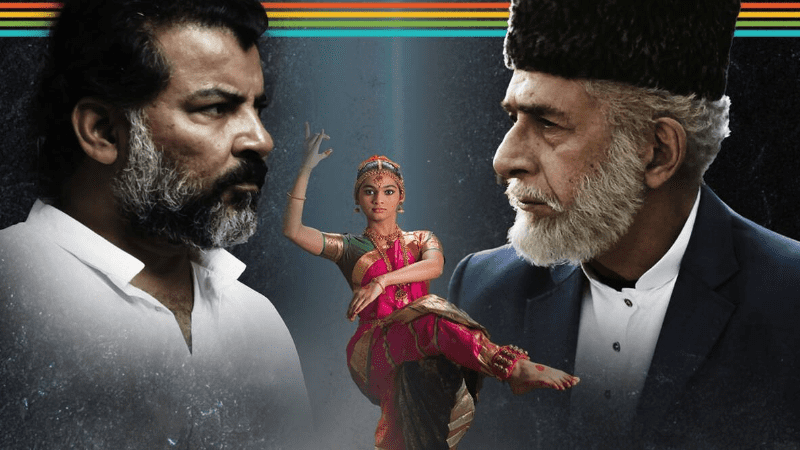

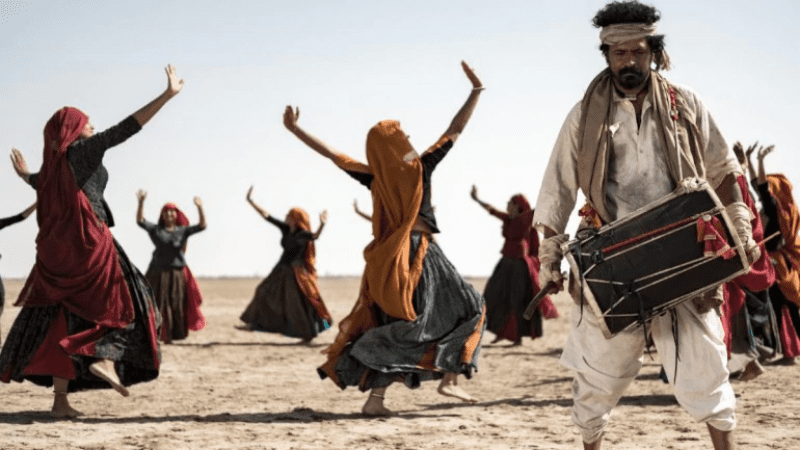
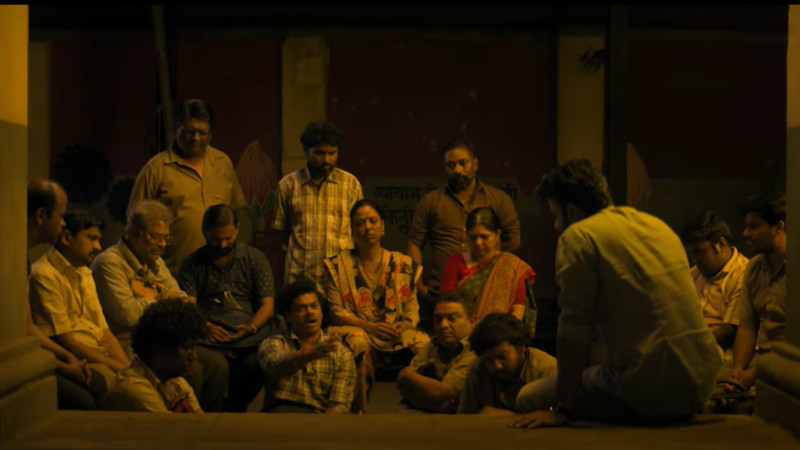
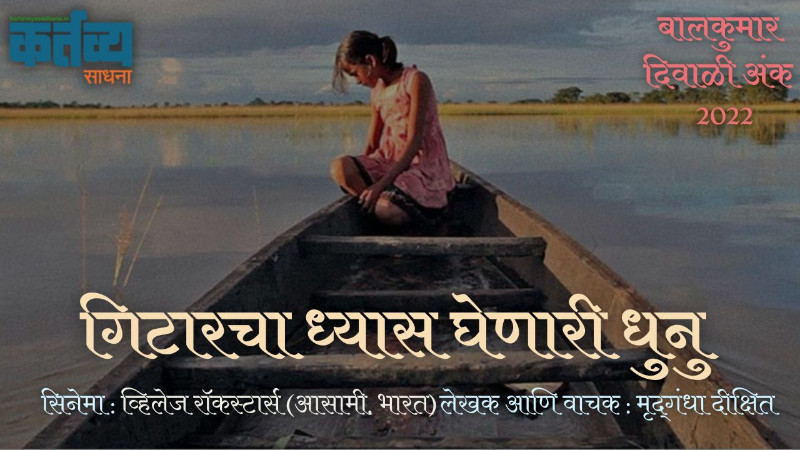
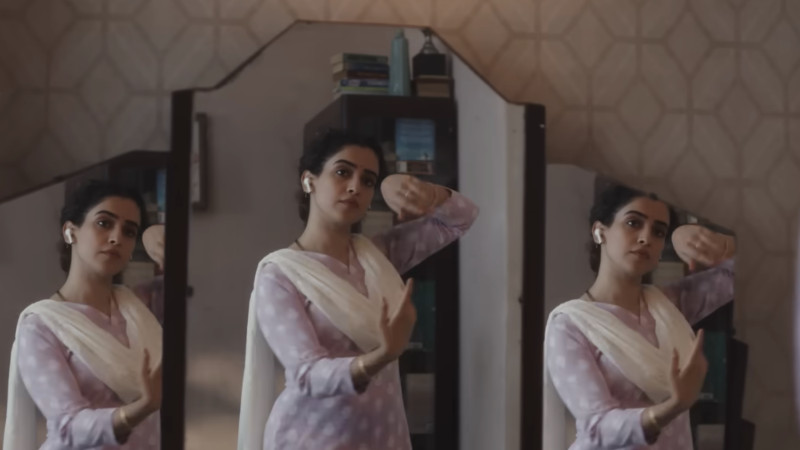
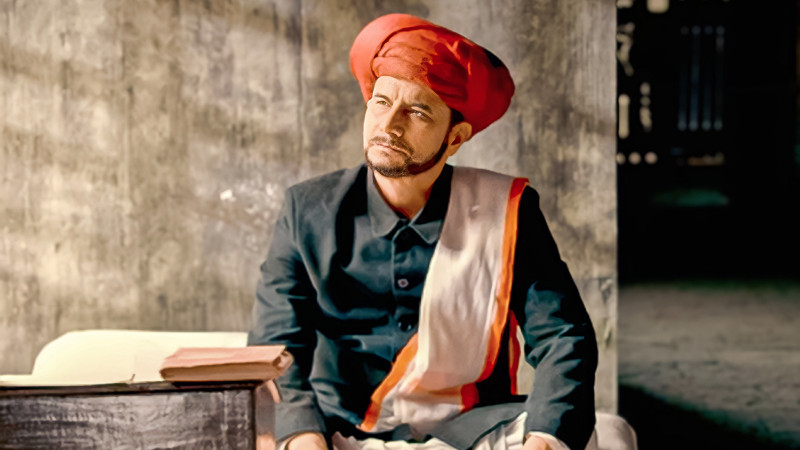

























Add Comment